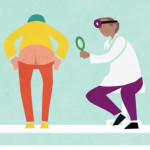Checkpoint inhibitor immunotherapy is safe and effective for people living with HIV, according to recent research. Treatments that help the immune system fight cancer have revolutionized cancer care, but HIV-positive people have generally been excluded from clinical trials of these new therapies.
Abdul Rafeh Naqash, MD, of the University of Oklahoma Stephenson Cancer Center, and colleagues assessed remission and safety outcomes among 390 people with well-controlled HIV who received PD-1 or PD-L1 checkpoint inhibitors to treat more than 10 types of advanced solid tumors or blood cancers. Some cancers can hijack the PD-1 receptor on T cells to turn off immune responses against them; checkpoint inhibitors release the brakes and restore T-cell activity. These drugs are also being studied as a potential HIV cure approach.
Overall response rates were 69% for non-melanoma skin cancer, 60% for Kaposi sarcoma, 47% for melanoma, 31% for non-small-cell lung cancer (NSCLC), 29% for non-Hodgkin lymphoma, 16% for liver cancer, 16% for anal cancer and 11% for head and neck cancer, the researchers reported. These rates are comparable to those seen in studies of HIV-negative people.
The study authors also compared outcomes for 61 HIV-positive and 110 HIV-negative people with NSCLC. The two-year progression-free survival rate was about 18%, and the overall survival rate was about 42% in both groups. The frequency of immune-related adverse events was also comparable.
This study “provides a level of assurance that immune checkpoint inhibitors are broadly safe for people with HIV and have the potential to effectively treat several types of solid tumor cancers,” says Naqash.







Comments
Comments